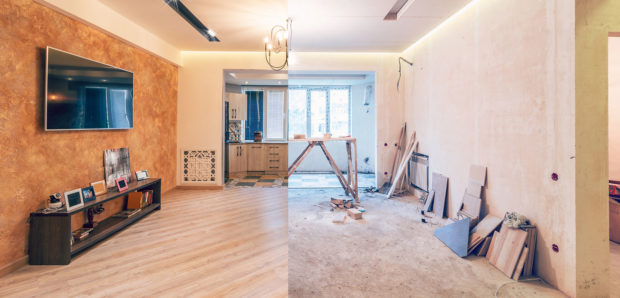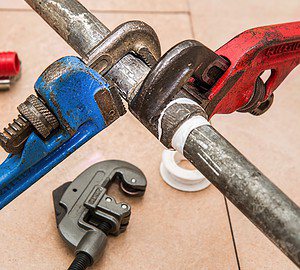Are you starting your long-awaited renovation project? This is an exciting time! But are you really ready? There are 7 decisions you need to make at the beginning that can either make your renovation a great success, or an epic fail.

So, what are the 7 factors you need to consider before you begin your home renovation? These are:
- Getting clear about the purpose
- Preparing a renovation plan
- Thinking ahead for future needs
- Organizing your budget
- Ensuring the details are covered
- Checking for asbestos
- Deciding to DIY or hire a professional
The time you spend now on these 7 factors can save you time, money and worry in the future. Keep reading to find out how.
1. Getting clear about the purpose
Home renovations can be a huge investment, so you need to get really clear about the outcomes you want before you begin. There are two general reasons for home renovations:
- Long-term lifestyle: Here the renovation is about making the best use of the space you have, preparing for the future, and increasing your property value.
- Short-term fix: Are things broken and you can no longer put off the inevitable fix? Here the renovation about keeping the scope focused.
For example, bathroom renovations are a great way to improve the lifestyle benefits of your home by optimising the space and enhancing the quality of features. Alternatively, new shutters or blinds are an easy short-term fix to dress up existing patios and decks and maximise their usability.
The danger is that at short-term fix project slips into a long-term lifestyle renovation without the proper planning and budget. So, before you begin, get crystal clear about the purpose of this renovation.
2. Preparing a renovation plan
Once the purpose of the renovation is clear you can prepare a plan to meet these objectives. Decide what is in and out of scope for the renovation. Collect design ideas and put them together on a design board. These pictures will help make the renovation result much clearer.
Use the plans to develop a list of questions you need answered. Ask friends or families for professionals that can help answer them and use their advice to revise your ideas and plan. Continue research and revision of the plan until you have a plan that is feasible and is the best way to meet your objectives.
Take a look at the important aspects of your renovation plan:
- Colours: You have to consider the colours you’d like to use from the very first day of planning so everything will fall into place–from the wall paint to the colours of your home decors. Do you want a neutral color such as white, beige, cream, or gray?
- Layout: This factor is important for you to know where to place your furniture and appliances with respect to the proper flow of air, light, and aesthetic view.
- Space: Do you want an addition or extension in your home? You probably want to lighten a room with an open space kitchen ambiance and eliminate some bulky cabinets to accommodate more appliances.
3. Thinking ahead for future needs
It is wise to think now about future needs. For example, from a lifestyle perspective, adding a swimming pool in your backyard creates a wonderful family space for years to come. But what about the inevitable impacts of reduced mobility, either of yourself or other family members who may visit. Think about the house entrances and stairways. Could they cater for mobility equipment in the future?
Here are the benefits of thinking about your future needs before renovating:
- Avoid costly excavation and renovation in the future because you need to relocate a bathroom or kitchen due to an expanding family or some other reasons.
- Save yourself some money from frequent home design changes.
- Ensure that everyone is able to move properly, safely, and happily, most especially aging family members.
4. Organizing your budget
Whether you’re planning to have a kitchen renovation, bathroom renovation, or a major home renovation, budgeting is a crucial factor to consider. The budget is where your plans get real and there are three important steps:
- Be honest about what you can actually afford. Financial worries from overextending your funds can ruin relationships, so work only within your real limitations.
- Add on a buffer to cover any unexpected costs or issues. While a solid plan minimises the risk of surprises, something unforeseen could need extra funds. It is recommended to add 20% on to your budget to cover these events.
- Check your budget regularly. Spending time tracking costs and budget is not fun but is exactly what you need to do to stay on track. Get timely accounts from your professionals and tradespeople to stay on top of costs.
While you don’t want to cut corners and sacrifice quality, there are clever ways to save money. For example, you don’t have to purchase expensive equipment. You can hire tools and equipment, paying only for the things you need, when you need them.
5. Ensuring the details are covered
Much attention is paid to the big-ticket items in a renovation but missed details can create delays and rework. In the bathroom it is easy to focus on the features like the sinks, bathtubs and tiles. However, you also need piping, grout and plaster – the small supplies needed to install the features. A new deck or patio is a great addition to a home, but make sure you consider outdoor blinds to protect from the sun and make best use of this space.
Make sure you have a full list of all the tools and equipment you will need. If you or the contractor don’t already have it, and you can’t borrow it, then you will need to decide if you will purchase or hire this equipment.
Depending on your budget, you can purchase a wide variety of tools and equipment that you can use to complete your renovation project. Here’s a list of what you will need for your renovation project:
- Hauling Equipment: This includes a vehicle that you can hire or rent to move your materials and furniture from one place to another.
- Power Tools: These are the most common tools that are used during home renovations as it can make home renovation projects easier. These tools include drills, hammers, jacks, screwdrivers, and more.
- Demolition Equipment: These tools are used to tear down and replace old walls. It consists of demolition equipment such as bulldozers, cranes, and cranes.
Another important consideration is removal of the renovation waste. This includes building materials, appliances and furniture. Estimate the amount of waste and contact a rubbish removal company for advice on how to manage it.
6. Checking for asbestos
Asbestos was used up until the 1980’s in construction materials such as roofing sheets, roof and floor tiles, and insulation (including pipes). When asbestos is damaged fibre particles can be released in the air. If inhaled these particles can cause asbestosis and a number of cancers.
It is vital before you begin any renovations you check for asbestos. If your house was built before the 1980’s there is a good chance that there will be asbestos somewhere. The identification, handling and removal of asbestos is regulated in Australia. You will need to use an accredited contractor to deal with asbestos if it is present.
7. Deciding to DIY or hire a professional
There are pros and cons to each option.
The advantage of DIY is that if you have the skills and time you can save a lot of money. However, you will need to take responsibility details such as council approvals, coordination of project steps, and organising all the required tools and equipment.
There are areas where doing work without the skills can be downright dangerous. This is true for electrical works where a licensed electrician should always be used. This is also the case for any renovations including plumbing, such as bathrooms, kitchens and laundries. If you are not skilled in plumbing you could at best create a real mess, or at worst set your project back in time and budget through errors.
The disadvantage of hiring professionals of course is the cost and the lost opportunity to learn new skills. However, the cost must be balanced with the potential consequences to your safety and the overall success of the renovation if you overstep your limits.
The success of your renovation depends on the decisions you make before you begin. Spend time today on these 7 factors to set yourself up for a renovation you can be proud of.



